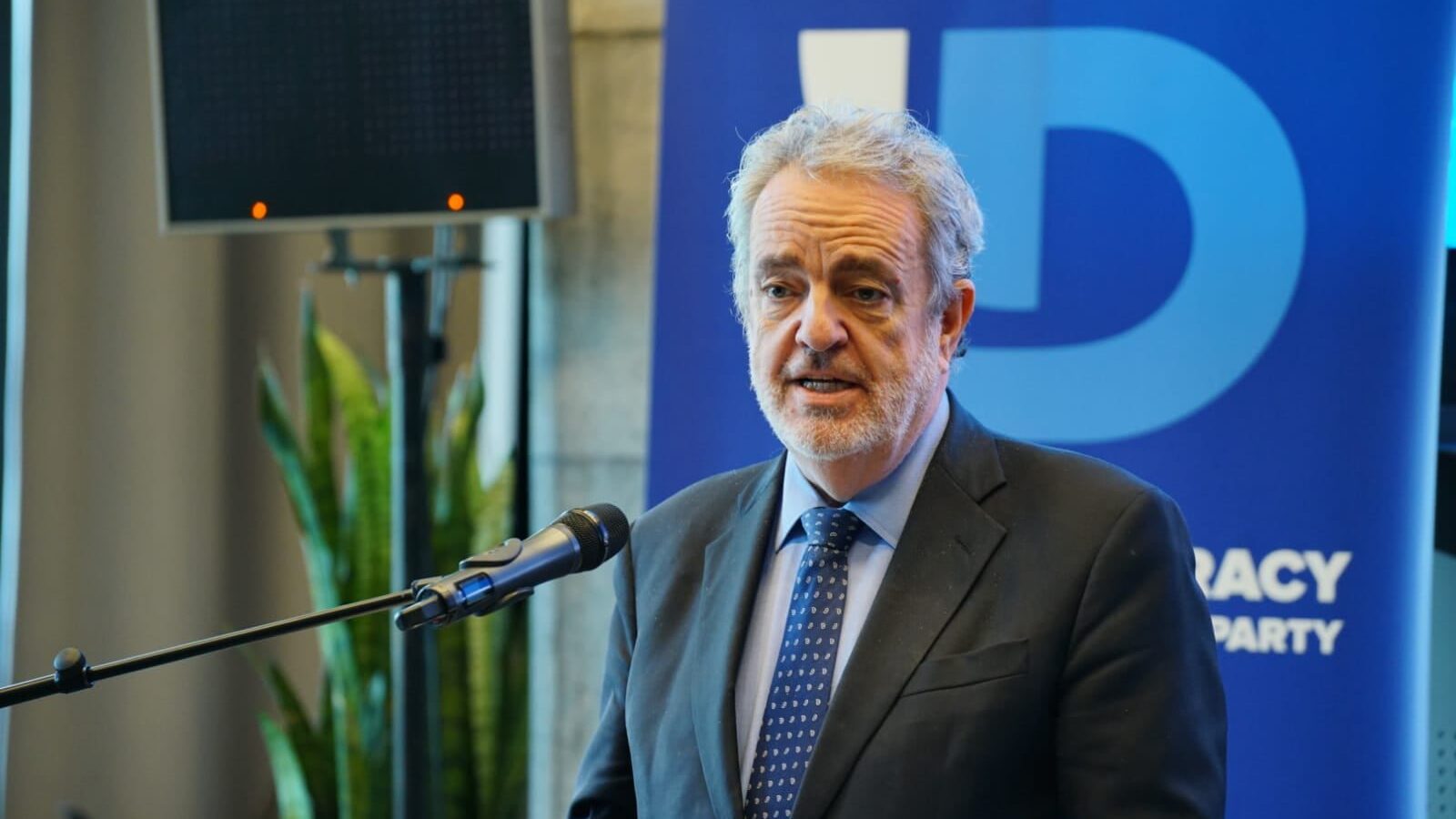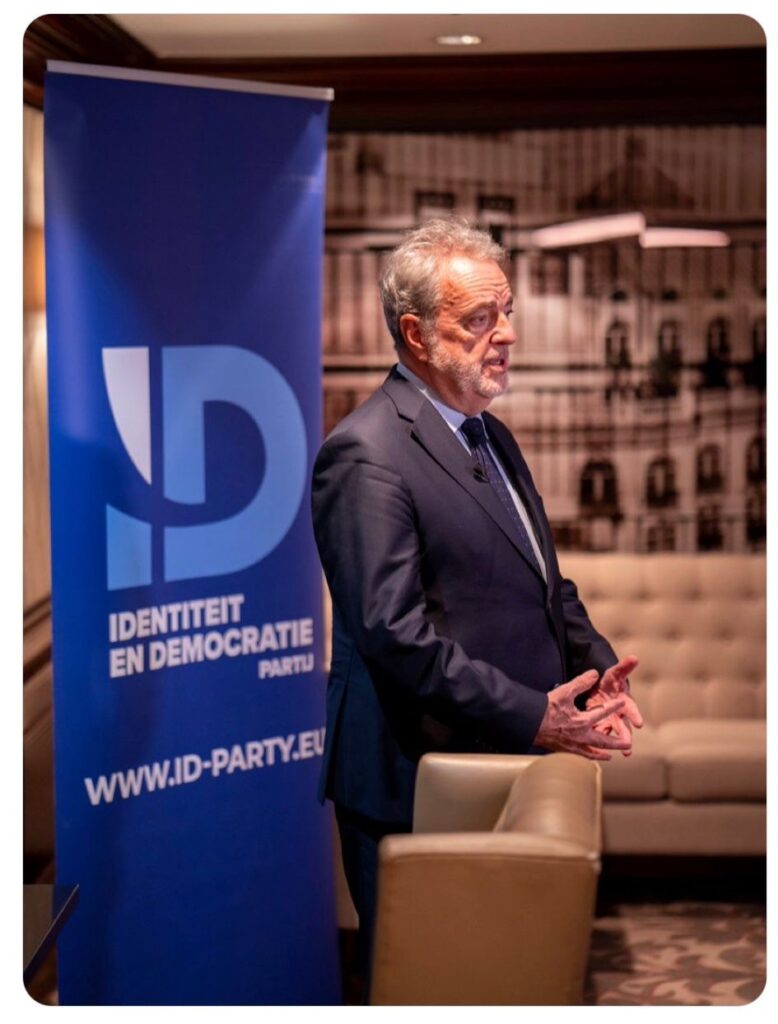
Gerolf Annemans is an MEP for the Belgian political party Vlaams Belang (VB) or Flemish Interest, which according to the latest polls is the most popular party in Flanders. He serves as the leader of the party’s delegation in the European Parliament and is the president of the ID Party. Following his address at CPAC Hungary, Mr. Annemans sat down with the European Conservative to discuss Belgian politics, the European Right, the upcoming European parliamentary elections, and other topics.
Well, basically from time to time, I say, “You know why!” That’s what we say to the voters. They know very well what we stand for: more independence and freedom for the Flemish within the Belgian state, saying no to migration, EU critical, not following woke nonsense—that is basically how people in Flanders know us and that is basically the reason why they vote for us. Because they know who we are. And they know that what we say, we mean it. And what we mean, we go for, and we don’t compromise. It has been a successful formula for thirty-five, forty years now. So we don’t have to explain to the Flemish who we are.

Put simply, N-VA is a copycat party that came into being in the last ten to fifteen years that used and abused the leadership crisis our party had in 2009 and 2012. So in that period, N-VA presented itself as the real liberator of the Flemish prison we are in, within the Belgian state. The N-VA’s leader, Bart De Wever, is only the latest of a succession of politicians who have presented themselves as heroes of the Flemish people. The first Flemish politician who did this was Guy Verhofstadt; he became Prime Minister and forgot all about his promises, and now he is a hateful EU fanatic. The second was Mr. Leterme, a leader of the Christian Democratic and Flemish party (CD&V), who also served as prime minister and failed to live up to his promises. Then, De Wever, after distancing himself from Leterme, soon became the third hero and the Flemish believed him. Upon entering government in 2014, he started to compromise with the system to have the possibility to become a member of the federal government. He, therefore, had to deceive his voters and those Flemish that believed that he would keep his promises. However, in 2018, when the government De Wever was a part of ended, voters had begun to see that the N-VA was not the solution to the Flemish problem, and they promptly came back to Vlaams Belang.
The N-VA, so as not to spoil their chances to once again enter government at the federal level, have to say, even on the Flemish level, “We will not deal with Vlaams Belang.” That is the official position of N-VA. They respect the cordon sanitaire that is imposed by the French-speaking Walloons in order to keep their chances to govern at a federal level open. So, as you can see, Belgium is a mad country, and it is comparable to the European Union—an artificial union with special rules and mechanisms that are incomprehensible. The only state that is more or less democratic in Europe is France, where you have a presidential election in a more or less American way, where the winner can take all. All the other democracies in Europe are compromises following dodgy rules and dark angles to get into power.
Well, their official position is that they will not agree to it. Of course, we will pressure their president, Mr. De Wever, on it, though. He most certainly is playing politics, however. I can show you interviews in newspapers where he uses very harsh language about us. We are blamed for everything. And he uses the words of the enemy to bash us. And also to show to the enemy, I’m a trustworthy guy, I’m a reasonable guy, I don’t compromise with these fascists and chaotic revolutionaries.
And this makes us very distraught because in Italy we can clearly see what happens when the Right comes together. And when Right parties compromise with one another and present themselves to the electorate, you see that quite clearly, they gain an absolute majority.
If they cooperate, the Right cooperates, it will always be strong. That is precisely why I have come to CPAC, where the spirit of, let’s say, transatlantic cooperation is in all of us. No one is pointing fingers and no one is being excluded.
Well, that is why I try to promote the Identity and Democracy (ID) Group. All of the delegations within our group respect one another, despite whatever minor differences we may have, and we are united by the great admiration we have for our respective national identities and the desire to preserve them. I think all right-wing conservative groups, when interacting with one another, ought to adopt the attitude of the ID Group—which is based on mutual respect, not pointing fingers over some small detail or something in the past, and focusing solely on the future and defending national identity. Furthermore, I think events like CPAC are crucial for nurturing the mutual respect that’s required for coalition-building and laying the groundwork for future cooperation between conservative forces.
Well, last week I published my third book on the peaceful separation of Belgium. It is quite technical. I published the first book in 2010, and the second in 2014 when De Wever promised that he would take over and liberate Flanders. My latest book in the trilogy is called Momentum. I have achieved the work. My fear, publishing my first book titled After Belgium—The Orderly Split-up, was that the radicals in my movement would say, ‘You are too reasonable! You want this to be done in accordance with international law!’, et cetera, et cetera. But basically, that is my project.
I want the separation of Belgium to be done in an orderly manner. Of course, we do not want revolution or chaos as De Wever claims we want, but we would like this to be executed in a proper way, orderly. And this project has nothing to do with what they say it does. We are not dangerous separatists. It is a word that they use for Palestinians throwing bombs or even Ireland [the Irish Republican Army], Russians, Scottish, and Basque bomb-throwing guys. No, we are a political movement. I repeat we are a political movement. We want a peaceful solution for this Belgium problem, which is a real problem because if you look at the European budget numbers now, as I explained, we are somewhere in the neighborhood of Greece. So, there is a real socialist problem in Belgium, and Flanders should go its own way. The right-wing parties in Flanders, the central parties, and ours should work together as they do in Italy and Hungary. In countries like these where right-wing parties took over the government, it is because of the cooperation of the resistance, and the resistance has to cooperate in a peaceful way. So I am not promoting violence. There are two articles in my concept of the orderly split-up: international law and non-violence which are red lines, and I designed my project with these red lines in the framework.
We are marching together as ID and we hope to be able to make this right-wing cooperation in the European Parliament possible, and we are available for any discussion, be it like before the Ukrainian war when we had discussions in Warsaw with Kaczynski and Morawiecki, toasting to the potential merging of ECR and ID groups. Those talks had the establishment panicking because had the ECR and ID groups united, a very large parliamentary bloc would have been formed. Of course, we hope ID is enlarged by electoral victories and by some other delegations. We go on with this battle as it is necessary and must be done, and I hope it can be done with right-wing cooperation on a broader scale.
We will, of course, be open to this discussion, but it is urgent because the hour is late. The green agenda imposed by climate fanatics in the European Parliament is scheduled to begin in 2024, and at the end of it is a highly controlled, Chinese-like society with digital passports, with bureaucrats saying what kind of house you will be allowed to build, or what kind of car you may drive…
This schedule starts in 2024. So, [what we have to do] is urgent, we have to do it now, and we have to do it urgently.
